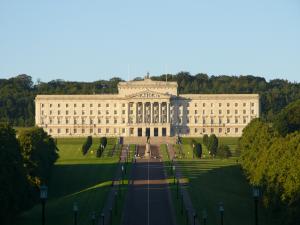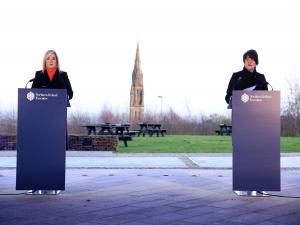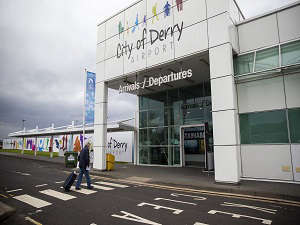
By Michael McHugh, Press Association and Adam Evans
Direct rule from London cannot be imposed in Northern Ireland without Irish government input, the Irish foreign affairs minister said.
The British government has warned it may pass legislation to fund public services in Belfast.
Powersharing talks are at a high-stakes stage and cannot continue for many more weeks, minister Simon Coveney added.
He said: "The status quo is not sustainable in Northern Ireland."
.@simoncoveney says a deal can be done at Stormont - and he believes it's badly needed... pic.twitter.com/3L7W2b2Jpl
— Q Radio News (@qnewsdesk) September 5, 2017
Dublin is under a legal obligation to be consulted on issues involving North/South co-operation under the 1998 Good Friday Agreement between the British and Irish governments.
Mr Coveney was in Belfast to try to kick-start powersharing at Stormont and said all parties wanted to see progress made.
But he reminded them while the negotiations continued Northern Ireland has no voice at the Brexit talks table.
Ministers have not sat at Stormont for seven months after the late Martin McGuinness resigned as deputy first minister in a row over the DUP's handling of a botched green energy scheme.
Since then a dispute over the status of the Irish language has been among the issues dividing the parties.
Northern Ireland Secretary James Brokenshire has warned he may have to legislate for a Stormont budget if the deadlock continues.
Mr Coveney said there were still grounds for optimism and direct rule should still be avoided.
"There can be no British-only direct rule.
"That is the Irish Government's position."
The 1998 Agreement bestowed a legal obligation on the Irish Government over North/South issues affecting Northern Ireland and the Republic.
Mr Coveney added: "It would be very difficult to even contemplate how direct rule would function in that context.
"We don't want to go there, it is not good for Northern Ireland, it is not good from the point of view of the government that I am a part of, it is not good from the point of view of the Government in London, everybody loses in that scenario."
He said there was an opportunity cost for Northern Ireland as tough decisions needed to be made over funding for health and education.
"Essentially Northern Ireland is in limbo at the minute because those decisions cannot be made, that is not a sustainable situation for many more weeks and that is why the stakes are very high now," he said.
He said he had no objection to a mediator but bringing somebody totally new into the talks when everyone else has such a detailed knowledge of the political complexities may not be helpful.
"If the parties want that we will try to facilitate that but I think it is unlikely," he said.


 Man attacked in home by masked gang armed with hammer
Man attacked in home by masked gang armed with hammer
 Man and woman die in Co Antrim crash
Man and woman die in Co Antrim crash
 Divided Stormont led to ‘chaotic’ Covid response, public inquiry finds
Divided Stormont led to ‘chaotic’ Covid response, public inquiry finds
 Irish government to fund flights between Dublin and Derry as it commits €1 billion to Shared Island initiative
Irish government to fund flights between Dublin and Derry as it commits €1 billion to Shared Island initiative